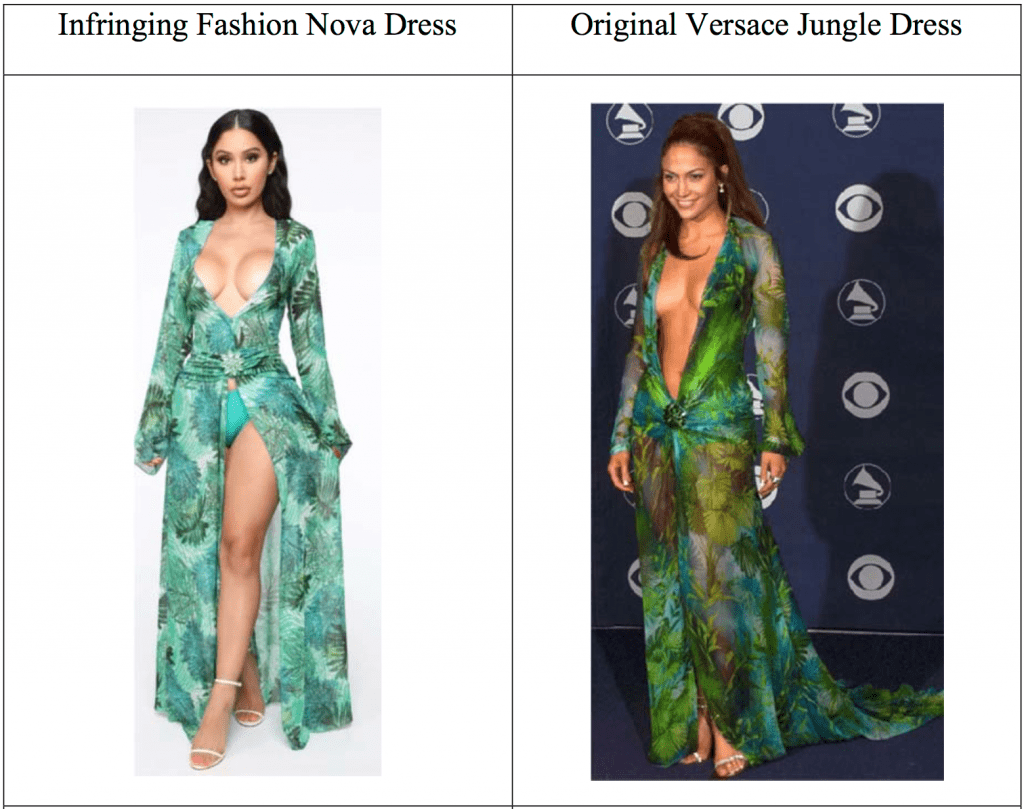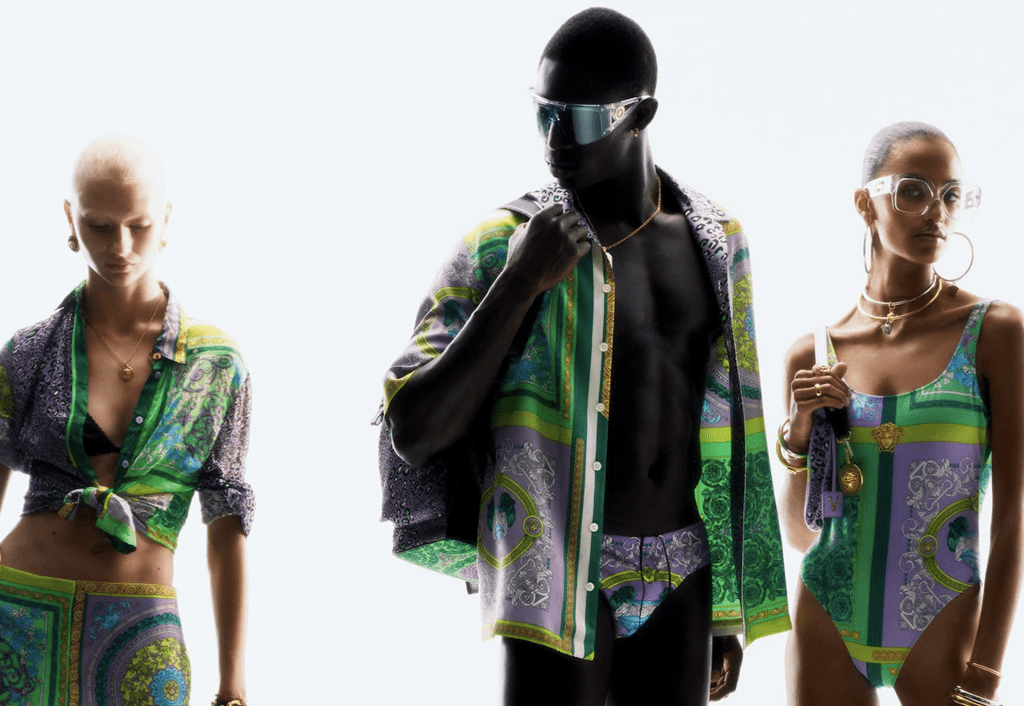Days ahead of the start of trial, Versace and Fashion Nova have settled the copyright and trademark infringement lawsuit that the high fashion brand filed against its fast fashion counterpart. In an order on July 15, Magistrate Judge Rozella Oliver of the U.S. District Court for the Central District of California states that the parties “agreed to a settlement in principle and will finalize the outstanding matters before the pretrial conference scheduled for July 16, 2021, with the district judge.” The parties’ trial was scheduled to begin on Monday.
The settlement brings to a close a year-and-a-half long case that Versace filed against notorious copycat Fashion Nova for allegedly selling “deliberate copies and imitations of [its] most famous and recognizable designs, marks, symbols and other protected elements” in an attempt to “exploit the popularity and renown of Versace’s signature designs, and to trade on [its] valuable goodwill and business reputation in order to drive profits and sales to line Fashion Nova’s pockets.”
In the complaint that it filed in a California federal court in November 2019, Versace asserted that it maintains rights in various prints and patterns that it has used over the years. “In blatant disregard of [its] rights,” the Milan-based fashion house alleged that Fashion Nova “manufactured, marketed and sold apparel using the same or substantially similar copyrighted designs and confusingly similar trademarks and trade dress” without its authorization, thereby, giving rise to a likelihood that consumers might be confused into believing that Fashion Nova’s products were “manufactured or authorized by, or in some manner associated with, Versace,” when that was not the case. By infringing its copyright and trademark rights, Versace argued that the California-based fast fashion company was causing it to suffer significant damage – both monetarily and in terms of its illustrious image.

As for the designs that Versace claims that Fashion Nova stole, those range from Versace’s famed – and copyright-protected – black and gold Barocco print and its “Pop Hearts” print to its various “Greca” link trademarks and of course, the “Jungle Print” dress that Jennifer Lopez made famous in 2000, a configuration that consists of a “green tropical leaf and bamboo pattern, plunging neckline extending to the navel, high-cut leg slit, circular brooch where the plunging neckline meets the high-cut leg slit, and long, flowing sleeves.” Versace claimed that consumers immediately associate the dress design with a single source, giving rise to trade dress protections for the “distinctive combination.”
Fashion Nova responded to Versace’s complaint in January 2020, denying the bulk of Versace’s strongly-worded claims, and setting out a number of defenses. On the copyright front, Fashion Nova argued that while Versace does, in fact, maintain copyright registrations “for certain designs at issue in this suit,” those registrations should be invalidated because Versace’s “copyrighted [prints] … lack originality,” “are standard geometric figures and patterns,” “are in the public domain,” and “are widely used in the fashion/apparel industry.”
In terms the trademark/trade dress infringement causes of action that Versace set out in its complaint, Fashion Nova’s counsel claimed that these should similarly be barred for a number of different reasons. For one thing, Fashion Nova argued that there is “no likelihood of confusion between [its] allegedly-infringing products and Versace’s purported trademarks and/or trade dress.” And even if there was confusion, Fashion Nova asserted that Versace’s claims are barred because the marks at issue – from the “Medusa Head” and “Greca” designs to the “J.Lo dress”– are functional, and therefore, are not actually protected since trademark law only extends to a product’s decorative, non-functional features.
And still yet, Fashion Nova asserted that even if Versace has valid trademark rights, and functionality is not an issue, it should still be let off the hook because it did not use the trademark-protected graphics and trade dress-covered dresses in a trademark capacity. Instead, it used them in a decorative capacity (not a source-identifying one), and thus, infringement is not an appropriate claim.
The settlement, which was first reported by Bloomberg, comes almost a year after Versace prevailed in a discovery dispute over whether Donatella Versace, the brand’s creative director and sister of its late founder Gianni Versace, would have to testify in connection with the case. The core issue in the since-resolved back-and-forth was whether Ms. Versace has relevant and unique information that Antonio Masciariello, Versace’s Company Heritage & Special Projects Senior Manager, did not provide in a recent deposition of his own. Fashion Nova argued that despite deposing Masciariello in August 2020, there was information relating to the case at hand that it could not obtain, thereby, giving rise to the need for Ms. Versace to testify.
In response to Fashion Nova’s request that the court compel Ms. Versace to testify, the fashion brand argued in a letter of its own that, among other things, Fashion Nova’s attempt to compel Ms. Versace’s deposition was not an exercise in legitimate fact discovery, but instead a tactic for leverage” – presumably to pressure Versace to agree to settle the lawsuit – “and harassment.”
Siding with Versace in her August 13 order, Judge Oliver held that “with respect to the general issue of deposing creators or designers of trade dresses, the Court finds persuasive [Versace’s] assertion that [Fashion Nova] has not cited to any caselaw to support the contention that depositions of such creators or designers are common in intellectual property litigation for purposes of supporting an invalidity defense.”
*The case is Gianni Versace S.r.l. v. Fashion Nova, Inc., 2:2019-cv-10074 (C.D.Cal.).











